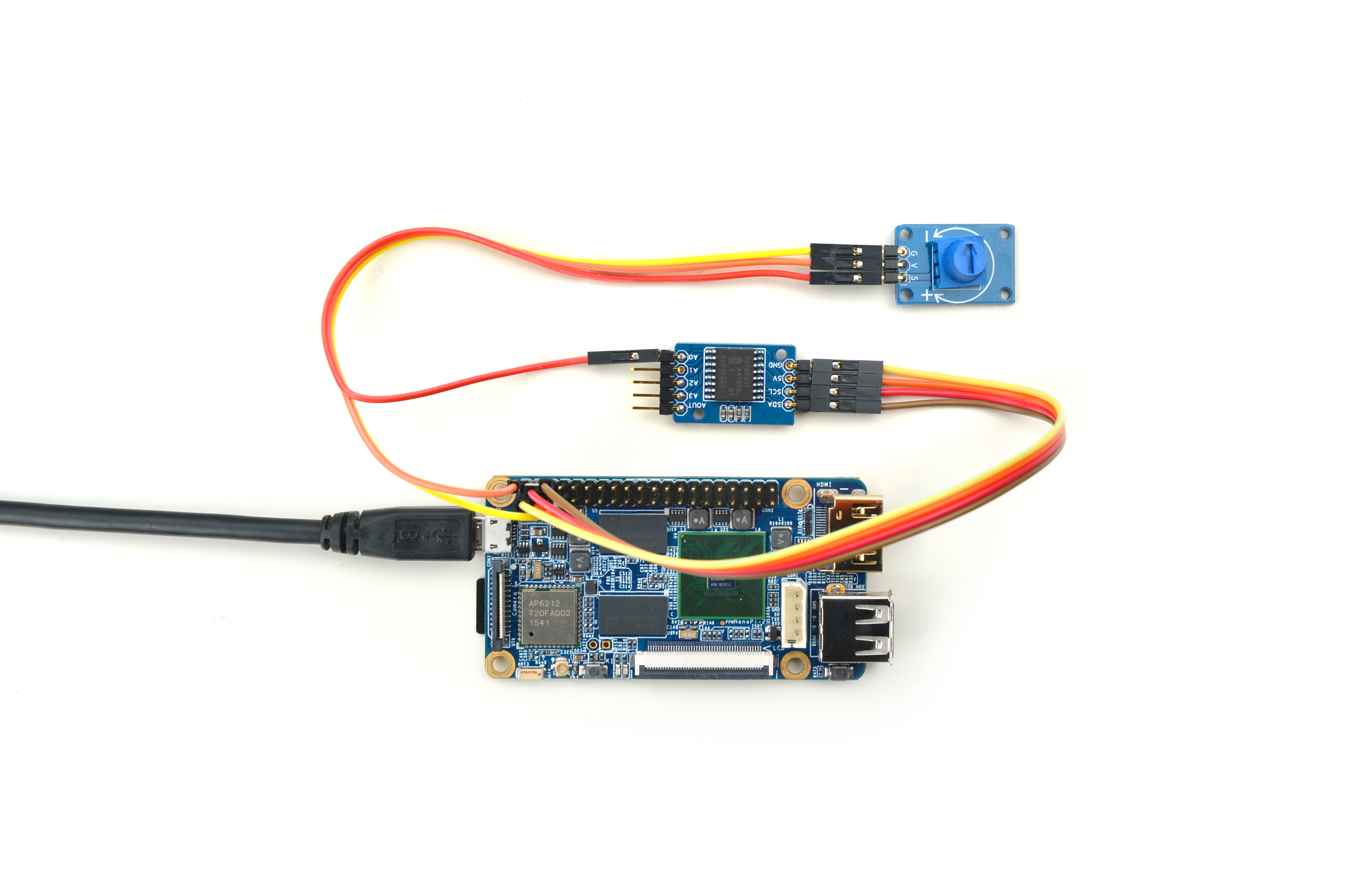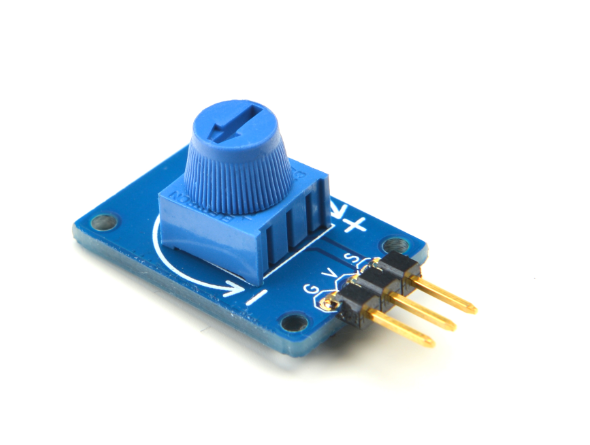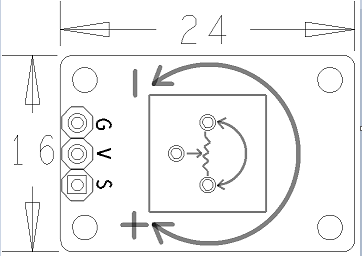Matrix - Potentiometer
English
Contents
1 Introduction
- The Matrix-Potentiometer module is a Potentiometer module. It can be used in audio control, motion control, transducers, computation and etc.
- 3 Pin 2.54mm spacing pin header, V is supply voltage, G is ground and S is output analog signal. Users can convert output analog signals to digital signals via ADC conversion.
- Output Voltage: 0 ~ Vcc
2 Features
- GPIO
- Small
- 2.54mm spacing pin header
- PCB Dimension(mm): 8 x 24
- Pin Description:
| Pin | Description |
| S | Analog GPIO |
| V | Supply Voltage 5V |
| G | Ground |
3 Basic Device Operation
- A potentiometer is a three-terminal resistor with a sliding or rotating contact that forms an adjustable voltage divider.If only two terminals are used, one end and the wiper, it acts as a variable resistor or rheostat.
- This module mainly contains a potentiometer where the resistance changes with changes between the contact and one end terminal.
4 Download Matrix Source Code
All the matrix modules' code samples are open source. They are maintained on GitHub :https://github.com/friendlyarm/matrix.git
Each branch in this hub contains the matrix modules' code samples for a board that the matrix modules can work with.
- The matrix-nanopi branch contains the matrix modules' code samples for the NanoPi;
- The matrix-nanopi2 branch contains the matrix modules' code samples for the NanoPi 2;
- The matrix-tiny4412 branch contains the matrix modules' code samples for the Tiny4412;
- The matrix-raspberrypi branch contains the matrix modules' code samples for the RaspberryPi
Please follow the steps below to get the source code:
Install the git utility on a PC running Ubuntu14.04
$ sudo apt-get install git
Clone the matrix code from GitHub
$ git clone https://github.com/friendlyarm/matrix.git
If this is successful a "matrix" directory will be generated, which will contain all the matrix modules' code samples.
5 Connect to NanoPi 2
5.1 Hardware Connection
Please refer to the following connection diagram to connect the Matrix-Potentiometer to the NanoPi 2:

Connection Details:
| Matrix-Analog_to_Digital_Converter | NanoPi 2 |
| SDA | Pin3 |
| SCL | Pin5 |
| 5V | Pin4 |
| GND | Pin6 |
| Matrix-Potentiometer | |
| GND | NanoPi 2 Pin9 |
| 5V | NanoPi 2 Pin2 |
| S | Matrix-Analog_to_Digital_Converter A0 |
This module's output signals are analog signals. You can use our Matrix-Analog_to_Digital_Converter to convert them to digital signals.
Please connect the Matrix-Analog_to_Digital_Converter to the NanoPi 2 and then connect Pin S of the Matrix-Photoresistor's pin header to Matrix-Analog_to_Digital_Converter's A0.
For more details about the Matrix-Analog_to_Digital_Converter module please refer to wiki: Matrix_-_Analog_to_Digital_Converter.
5.2 Compile Test Program
Please login the matrix hub and enter the nanopi2 branch
$ cd matrix $ git checkout nanopi2
Compile the Matrix code
$ make CROSS_COMPILE=arm-linux- clean $ make CROSS_COMPILE=arm-linux- $ make CROSS_COMPILE=arm-linux- install
Note: please make sure to install the cross compiler "arm-linux-gcc-4.9.3" on your PC, which is used to compile files for the NanoPi 2.
Generated library files are under the "install/lib" directory. The test program is under the "install/usr/bin" directory. Its test program is "matrix-adc".
The modules are under the "modules" directory. Its driver's source code is in https://github.com/friendlyarm/linux-3.4.y.git
5.3 Run Test Program
Please insert a TF card which is flashed with Debian to a Linux host and mount its boot and rootfs sections.
We assume the rootfs is mounted to /media/rootfs then please run the following commands to copy the driver, library and test program to the card.
$ cp modules /media/rootfs/ -r $ cp install/lib/* /media/rootfs/lib/ -d $ cp install/usr/bin/* /media/rootfs/usr/bin/
Insert this TF card to your NanoPi 2, power on and run the following commands to load the driver.
$ cd /modules $ insmod pcf8591.ko
Please run the following command to test the Matrix-Potentiometer module.
$ matrix-adcHere is what you should expect:

5.4 Code Sample
int main(int argc, char ** argv) { int i = 0; int value = 0; int channel = 0; if (argc == 2) { channel = atoi(argv[1]); } for (i=0; i<ADC_READ_TIMES; i++) { if (pcf8591Read(channel, &value) != -1) { printf("channel%d value=%d\n", channel, value); } else { printf("Fail to get channel%d value\n", channel); } usleep(10000); } return 0; }

